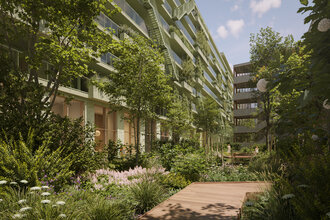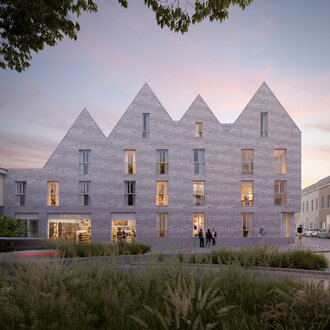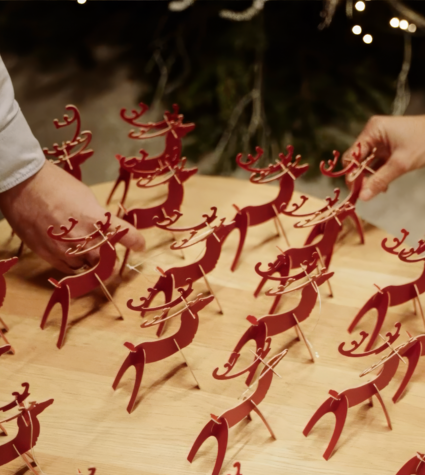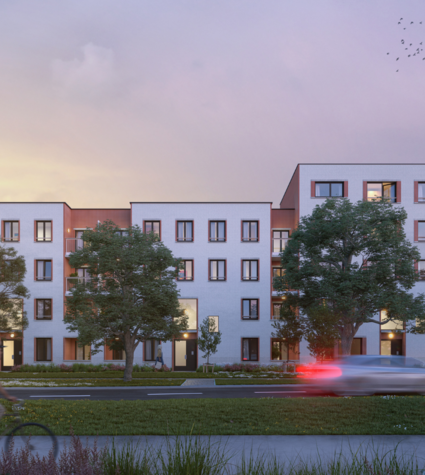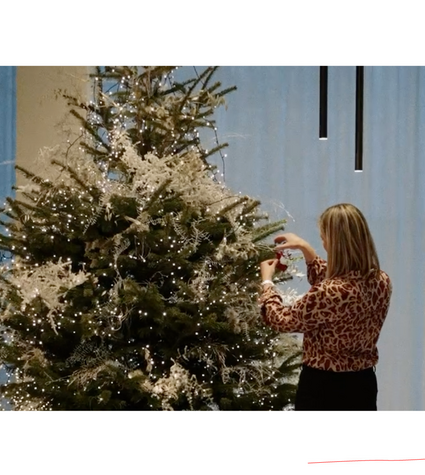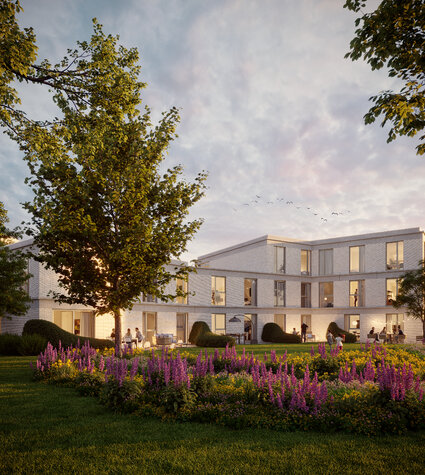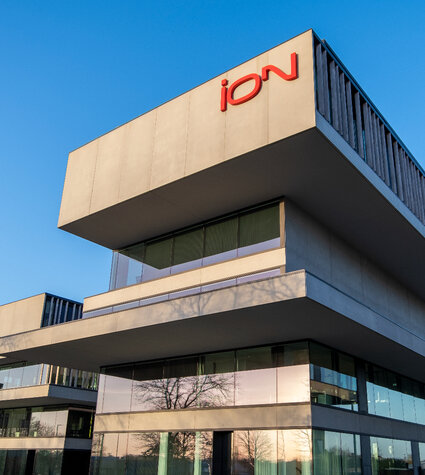
Forward-thinking center of expertise 'Wissel' for persons with non-congenital brain injury officially opened

The progressive concept, which closely involves the family and neighborhood, aims to help people rediscover who they are, what they are capable of and accept what has happened to them. 'Wissel' is a project of social networking organization Group Ubuntu, in collaboration with developer ION.
Because the previous center of social network organization Group Ubuntu was bursting at the seams and no longer met the needs, a completely new complex was built in collaboration with project developer ION at Sint-Amandslaan in Kortrijk. Behind the restored facade is a sustainable new building with 20 rooms with private bathroom, 4 care studios, communal living areas with kitchen, a room for the supervisors and a day center with rest rooms and work studios. Currently, a total of 51 people with NAH are supported, and the newly built center has 21 residents. These are both people with NAH and people with intellectual disabilities, all of whom can count on the care of residential coaches.
Combining living, working and therapy in the same place is usually avoided, but for people with non-disabling brain disorders, it's just an asset that benefits their well-being and rehabilitation.
"Normally we are not in favor of combining living and working in one place. People like you and I also go to work in the morning. But for people with NAH, this is different, because they are more quickly tired. In our previous building we had a rest room, but this was not enough. People who now come to Wissel can go to their own room or studio in the afternoon to rest for an hour before going back to work. This enhances their quality of life. Moreover, they live together with fellow sufferers; they understand each other's situation and can contact each other. Another advantage is that no transportation is needed to the day center from the home, as that is an expensive affair these days." Petra Vercruysse, general manager Group Ubuntu
Finally living independently
Margot Lottin (27) is one of 21 residents whose life through the center looks completely different. She fell into the basement hole of a café 10 years ago, causing a severe brain injury. After a weeks-long coma, she had to relearn everything. Continuing her education as a teenager was her big goal, but the harsh reality was that because of her condition, even getting a job at a tailoring company was out of the question. But Margot never gave up. She had long dreamed of being able to live on her own like her peers, and now, thanks to this new center of expertise, she has succeeded. She was able to let go of the parental home and all the care she received there and now lives independently in the new NAH center .
"At home I shoved my feet under the table, but here there is no food ready when I get home. Together with my living coach, I have a clear schedule: then clean the bathroom, then vacuum or cook. In the meantime, I manage to make my own pot. If I want to cook in the afternoon, I have to start it on time so I'm not late for work. I find it so important to be able to be independent between therapy sessions, to decide for myself what I do at what time. Because everything is close by here, I can meet up with friends on foot or by bike or go to my volunteer work." Resident Margot Lottin

Faster budgeting
Independent living is anything but obvious for people with disabilities. It is not only a challenge to find a suitable place, but also to scrape together the necessary budget is rarely self-evident. For people with NAH, the support is either paid through insurance or from a budget allocated by the Flemish Agency for Persons with Disabilities. According to the Flemish government, 20,000 people are entitled to such a personal budget. While until recently people with an urgent need for support had to wait three years for their allowance, there should now in principle be a budget within 18 months of the application.
Own methodology
Group Ubuntu has developed its own methodology for people with NAH: Brain Breaker. On the basis of psycho-education and exercises, their brains are made stronger and more independent again. The participants discover who they are, become proud of what they can do and learn to accept what has happened. The package includes both individual sessions and group therapy, with or without his or her entourage. Because even the lives of family members, who often already have several years of care behind them, suddenly look completely different.
Workshop work, where internal and external people meet and learn to work together, is part of the care package. There is a company workshop where tasks are carried out on behalf of external employers (semi-industrial work), a wood workshop and a creativity workshop. In the community kitchen, someone is regularly engaged in household tasks, such as making soup.
"An activity here is never just any activity. We start from each individual. Jimmy, for example, was active in interior design before his brain injury. He completely blossoms when he can work with wood together with a coach and volunteer. And Gregory also finds his niche here. At 14, he survived the accident in which his father died. Before that he was a carefree child, but when he arrived here he no longer had a goal in mind. Now he is a twenty-something who has built a new social life, he lives in his own studio, and he sees the future smiling again." Petra Vercruysse, general manager Group Ubuntu.


Group Ubuntu very deliberately offers different living concepts, always with the support of residential coaches. There are 20 rooms for residents with private bathrooms and common living areas and kitchen. In addition, 4 care studios are also offered with their own bathroom as well as a separate kitchen and living space. Careful consideration is always given to each individual to determine which form of living best suits that person.
"Patrick suffered brain damage in a house fire when he was 25 and is now 52. We are convinced that we made the right choice with a studio. Patrick needs a lot of closeness, but he also hunkers down when something is out of order, such as a dish left standing. Where he used to live, he was the one who did the dishes for everyone and made sure everything stayed neat, just because he can't stand sloppiness. In his studio, he is responsible for that himself, which gives him peace of mind. Whereas in the beginning he still isolated himself, he now chooses to go along on activity and finds more and more his place in the group. He was a cook before the accident, and he is picking up that thread as well. He loves nothing more than making his fellow residents happy with tasty soup or homemade spaghetti sauce." Residential coach Joshua Anckaert
Building a new life is not something people do alone. Besides the support of housing coaches and family, the neighborhood is also closely involved. The new NAH center, in the heart of the city and near the Leie, is part of a master plan where different generations and people come together around a common courtyard. That includes quayside houses on the Lys, apartments and a protected villa that will be converted into student rooms. The completion of the family homes is scheduled for the end of next year, according to project developer ION. The student rooms, sales of which have just started, will follow later.
"For us, this site is another great example of how to ensure more inclusion in cities, something we strive for as much as possible. Soon you will find here a balanced mix of student rooms, apartments and this center of expertise. We are convinced that when everyone can find their place in a neighborhood, it also immediately becomes a lot more pleasant, social and lively to live in." Kristof Vanfleteren , CEO & Co-founder ION
Recente artikels

